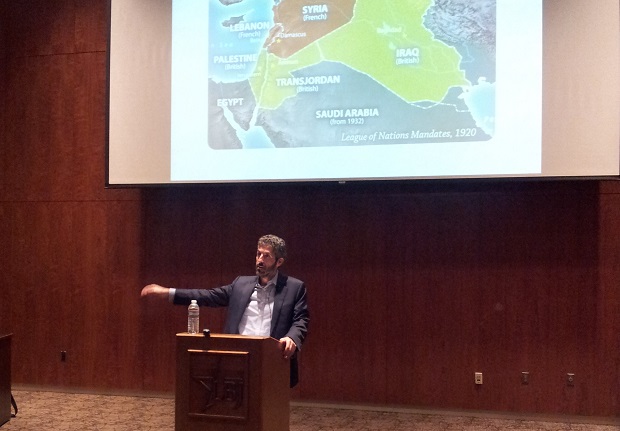The emergence of sectarianism in the Middle East is a modern historical problem. That was the message of Dr. Ussama Makdisi, Professor of History from Rice University, in his October 2 lecture at the LBJ School. Only by evaluating sectarianism as a complex historical development, Makdisi argues, can we hope to move beyond repeated failed attempts to quell Mideast violence and help establish the conditions for a lasting peace.
According to Makdisi, sectarian strife in the Middle East should be understood not as the natural manifestation of violence between inevitably opposing groups, but rather as the product of mishandled policies following Western decolonization in the region. A central premise of Makdisi’s argument rings true: Western policy makers and media organizations have shown little desire to understand the nuanced history of the Middle East, instead falling into simplistic interpretations of current political discord. Seen through this lens, current violence in places like Syria and Iraq seem to result from entrenched religious and political identities. By this reasoning, the Sunni-led Islamic State and the predominantly Shiite Iraqi government are natural enemies.
Though the enmity between these groups is obvious on its face today, Makdisi argues that it is a recent historical development.
Large populations of Sunni and Shia people, Makdisi reminds us, lived in relative peace together for centuries from the end of the medieval period to the decline of the Ottoman empire in the 19th century. It was only after the secularization movement of the 20th century that ethno-religious nationalism began to produce escalating conflict in the region, conflict that initially centered on the Balkans. An irony for groups like the Islamic State is that its forebears hardly considered sectarian identity a starting point for violence. Modern sectarian conflict emerged at a significant level only after the decolonization of French Syria and British Iraq from the 1930s to 1950s. When withdrawing colonial powers drew arbitrary borders and the resulting governments failed to successfully carry out Western style reform, sectarian tension that had not been seen since the medieval period re-emerged.
Makdisi’s ultimate point is this: the situation in the Middle East is neither inevitable nor permanent. We need to dispel the modern notion that violence in the region is the result of long-standing opposition between the Sunni and Shia. Adopted in the West perhaps because of its convenience, this modern interpretation of Islamic identity is restrictive, inaccurate, and – insofar as it misguides policy – arguably a contributing factor in the rise of violent extremism. A look at history shows that these groups and others like them are far from being existential enemies.
But how useful is Makdisi’s argument in practice? How should the U.S. and the Western world deal with a group like the Islamic State? How can extremists in the Middle East be re-integrated into a peaceful political process? When pressed for policy solutions, Makdisi had few points to make. Playing to his role as an academic historian, Makdisi remarked that understanding the history of a region can and should inform policy decisions. Of only slightly more substance, he asserted further that open dialogue in political processes is always more fruitful than repression, offering only the implication that the tyrannical Assad regime must be replaced. These points, while undoubtedly true, represented the extent of policy insight to be gleaned from the discourse.
The fact remains: the United States would do well to understand Middle Eastern sectarianism in a more nuanced and historical way than it has in the past. We should see the current violence not as an inevitable expression of conflicting identities but as a result of repeated political missteps by both foreign and domestic powers in the region. But as far as the tough questions of policy go — What are realistic alternatives to the Assad regime in Syria, given the wide swath of violent ideologies currently vying to replace it? And what policies can Haider Al-Abadi, newly appointed Iraqi Prime Minister, pursue to heal the sectarian tensions stoked by his predecessor? — the answers will have to fall not to the historians but to the policymakers.

